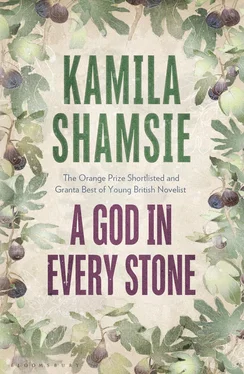The next morning Viv stepped out into a breeze which originated from two bearers snapping a tablecloth in the air, dark hands on white cloth. She had come out to see the sun rising from behind the mountains but haze smeared the sky and her presence clearly disturbed the hotel staff’s early morning preparations. One of the bearers apologised — for what? Being visible? Somewhere a rooster crowed, a dog barked in response. If Mary were here they’d return to the familiar, but still amusing, topic of dogs’ accents. The rolled ‘r’s in the bark of a poodle, the guttural growl of an Alsatian. And why was it that everything unacceptable in a man — slobbering enthusiasm, predictability, simple-mindedness — was so charming in a dog? She felt a pug’s disdain, and knew it wasn’t really Mary whose company she was missing.
She sat down at a table beneath a pine tree, picked up a pen and tried to think of what to write which would please Papa. When Mrs Spencer presented, as a fait accompli, Viv’s trip to Peshawar all his visible anger turned towards his wife, and what Viv had received instead was his bafflement. Why? he kept saying, wanting to understand, failing to do so, being wounded by that failure. Every day Viv thought of going down to breakfast and saying, I’ll return to the hospital — but then she thought of the boy with the sandy hair and the blue eyes and stopped herself. So she left with a promise: she’d be back in London by Christmas, and if the war was still on she would return to her nursing duties. Her mother sighed and shook her head when she heard that, but didn’t say anything about it.
One of the bearers brushed leaves and seed-pods off the starched white tablecloth, brought her breakfast, and sent a young boy to stand behind her with a large fan in his tiny fist. In his turban and waistcoat he reminded her of the monkey similarly dressed at an Arabian Nights party in England two summers ago. The monkey held a Japanese fan which it swept up and down the length of its body in a manner so vulgar — head thrown back, legs spread apart — that Mary almost left the party in protest before the host had the animal taken away. Viv gave the boy a coin and told him she didn’t need him. The rising heat of early morning felt like an old friend.
Setting the pen aside, she concentrated on breakfast. Tea and jam and bread in Peshawar. It was all so strange. When she had finished the bearer informed her that a boy had been waiting for her. At first she didn’t know what he meant, but there he was, near the hotel entrance, the boy from the train station, with a Victoria driver who knew the way to Shahji-ki-Dheri.
Through the Cantonment the horse trotted, all creaking harness and clopping hooves, down broad streets shaded by plane trees and cypresses, their familiarity an ache. But then the Victoria drove through the arched gateway of the Walled City and Viv rose out of her seat, exclaiming loudly at the glorious colour and noise and exactly-what-you-want-it-to-be-ness of it all. Birds beating their wings against dome-shaped cages, children sucking on molasses pebbles, sugar-cane sellers slicing whistling sounds out of the air to attract buyers, water-carriers with spines curved beneath animal-skin sacks filled with liquid. Pyramids of peaches and plums in wicker baskets, carpets draped over balconies and branches, clothes lines strung between top-floor windows with men’s clothes hanging from them (Native men of all ages could be seen craning their necks in the hope some female garment might have accidentally or — why not believe this? — deliberately been placed in view). There weren’t in fact any men craning their necks but she would say there were when she and Tahsin Bey found themselves in each other’s company again. She’d tell him tales of Caspatyrus that would make him smile that smile of exceptional warmth, and he would most certainly agree that the fabrication of stories was a form of tribute to Scylax, whose tales of India included impossible wonders.
The Victoria had stopped for no reason, and the boy — Najeeb his name was — said she should sit down. A white tent floated past, and Viv wondered if the woman within felt disdain or envy at the sight of an Englishwoman standing up in a Victoria, looking around, unimpeded. There were no other women, tented or otherwise, but looking up above the storefronts she saw some movement behind the enclosed wooden balconies; the latticework of the wood was replicated on the mesh of the tented woman’s burqa. Much like the grille in the Ladies’ Gallery behind which any women wanting to view parliamentary debates must sit so that men wouldn’t be distracted by their presence. It must be even more hot and stuffy in those burqas than it was in the Ladies’ Gallery, which she had once entered on Mary’s insistence to listen to a debate on Votes for Women — that was before her father had set her right on the issue by sending her to listen to the magnificent Gertrude Bell addressing the Anti-Suffragette League. (If all women were like Ms Bell and you, men would fall over their feet in their haste to give you the vote, Papa had said when she came home to report all that had been said.) She sat down and asked the boy if he had sisters. Yes, three. Didn’t they get cross-eyed behind a burqa? Their eyes learned to focus differently, he said, and she couldn’t decide if this seemed plausible or not.
The Victoria progressed along the famed Street of Storytellers and Najeeb pointed out the Storytellers themselves — men sitting cross-legged on the raised floors of open-fronted stores, audiences seated across from them on rope-beds beneath trees. The stories they told were in the form of poems called badalas, Najeeb said in response to her question, and she repeated the word badala and wondered where she could find a language teacher. Hindko was the language of Peshawaris, Najeeb said, and Pashto the language of Pathans.
— So you speak Pashto, Viv said.
— At home we speak Hindko. We are more Peshawari than Pathan, but we’re also Pathan. But everyone here speaks both Hindko and Pashto and many people Urdu and also English and every language of the world someone here can speak. This is Peshawar.
He said it with evident pride, making an expansive gesture which took in all the variety of the street — every manner of turban and cap and flowing garb. That man is from Tashkent, he said, and that one from Tibet; there’s a Punjabi, that’s an Afridi Pathan and that one is Sikh and those two Hindu. For the first time she gave him her full attention — a smiling boy with excellent but oddly pronounced English, as though most of his vocabulary came from books. He was dressed more formally than the day before in narrow black trousers, a white tunic, and a white turban with a grass stain which suggested he’d been standing on his head.
They turned into another lane and Najeeb said it was the Street of Partridge Lovers, and looked startled when she laughed.
— What else? Tell me all the street names!
— The Street of Dentists. The Street of Potters. The Street of Felt Caps. The Street of Silver. The Street of Money-Changers. The Street of Coppersmiths. The Street of Englishwomen.
— The Street of Englishwomen?
— They buy and sell Englishwomen there. We will try to avoid it.
— Take a detour through the Street of Inventive Guides if you must.
He looked delighted to be caught out, and she found she was delighted to have been teased.
He handed her a plum which he had plucked from the basket carried on a man’s head in the nonchalant gesture of one to whom theft isn’t understood as a crime, and she recalled attending one of Woolley’s lectures in which he’d said it was important to watch one’s workmen on digs in Foreign Parts because they could teach one how to understand man as he once was — how he functioned, how his brain worked in times past. If that was true why shouldn’t the great men of the ancient world have some shadow in the present in addition to the slaves? She might yet find a Herodotus in this city with its Street of Storytellers and its centuries of Greek influence. Herodotus was a Carian, not a Greek! She could picture Tahsin Bey so clearly as he said it, rising to his toes, his sharply angled face a picture of outrage.
Читать дальше












